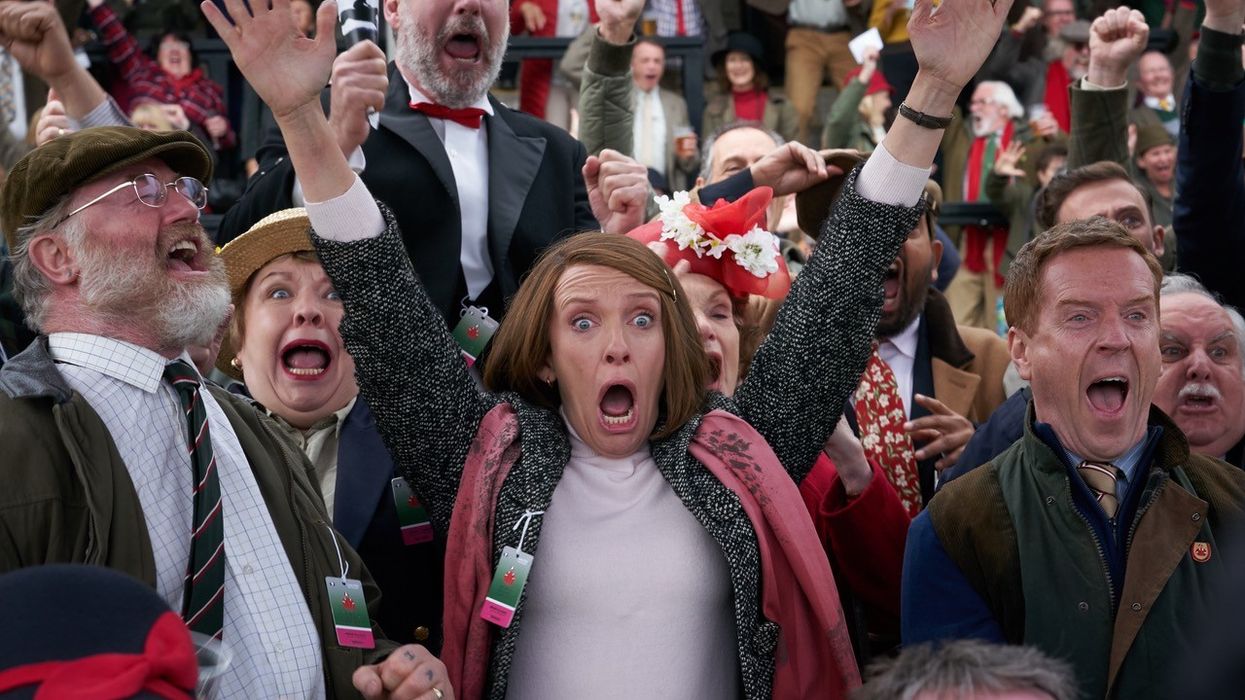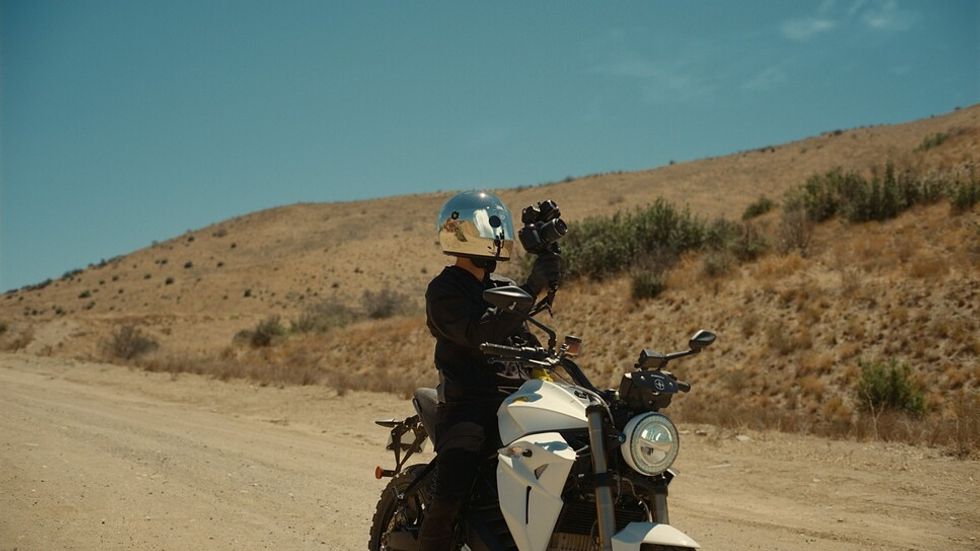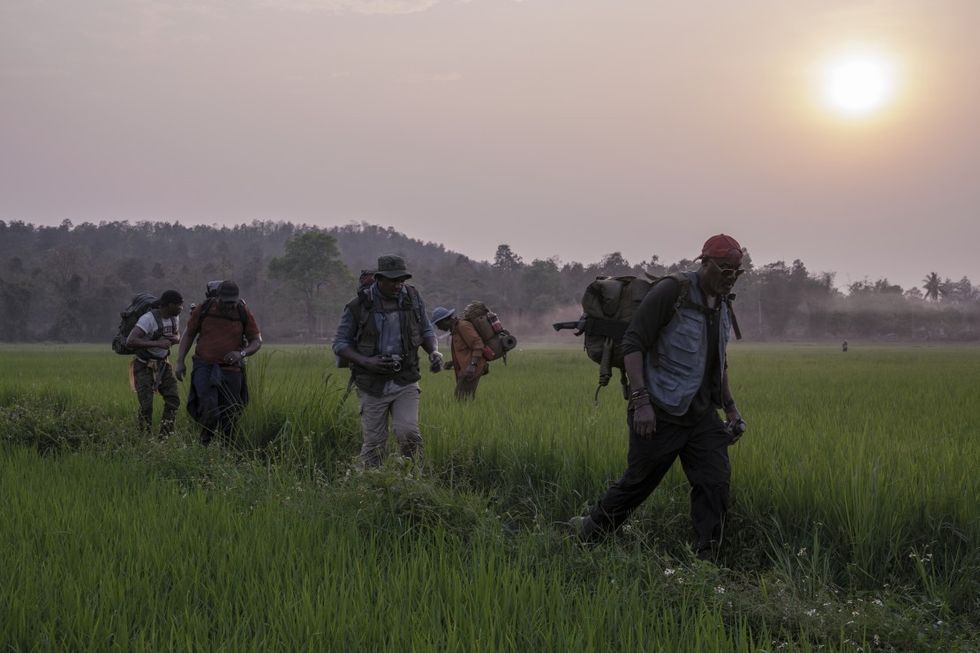How This Welsh Filmmaker's Dream Came True
Going from a Sundance Documentary to a Sundance Fiction Feature Film, the story of a Welsh village buying a horse balances telling a true story and telling a dramatic one.

It's hard to tell a true story, when the characters are still alive, and fit it into a dramatic structure that engages an audience. This is particularly interesting to see a film like Dream Horse, which successfully tells an engaging narrative while remaining true to the real-world events that inspired it. Based on not only a documentary that screened in Sundance 2014 (Dark Horse), but also the fuller true story behind the doc, Dream Horse tells of a syndicate of owners who invest in a racehorse that goes out to be a champion.
IMDB lists the logline as: "Jan, a cleaner and bartender, decides to breed a race horse in her Welsh village. As the horse rises through the ranks, Jan and the townspeople are pitted against the racing elite in a race for the national championship."
We got a chance to interview director Euons Lyn in conjunction with the film's premiere.
Check it out.
Telling Stories Truthfully with Dream Horse
NoFilmSchool: How did you end up getting involved in the project? You weren't involved in the original doc at all, correct?
Eunos Lyn: Correct. Because I'm from Wales, and this story broke when the horse won, and so it was all over the press, and it was all over TV news, and everybody in Wales knows about it. It's one of those apocryphal stories that everybody was talking about, the horse on the allotment that wins the grand national. So it was in my consciousness, and then I knew about the doc. I'd seen it, and then the producer sent me a script, and the minute I read it, I knew that I was desperate to direct it.
NFS: Some of your work, previously has been Welsh language, but the plan for this was always to be an English-language production?
Lyn: Yes. The intention for the film has always been to try and create a commercial movie that travels and tries to appeal to audiences across the world.
NFS: Casting two international movie stars and an international TV star in the lead, will help connect it with international audiences. Were you involved at all in the casting process, or had some of the cast already been attached when you were brought on board?
Lyn: That was the first task, really, is kind of figuring out who was going to play Jan because she's the character who makes the story happen, and we needed somebody who had steel, somebody who could be funny, somebody who has got that star quality but somebody who can play real people. There are so few movie stars that you can really believe playing a real person, and Toni was, for me, I've been a huge fan of hers ever since Muriel's Wedding way back when, and she was always my number one choice. Getting the script to her, getting her to read it, getting her to say yes was a proper dream come true.
NFS: One thing I did notice is that sort of instead of having one antagonist, the decision seemed to be made to sort of spread out the antagonists. There are more like three mini-antagonists. Is that something that was always in the script or something that sort of came about through development?
Lyn: Elements of it were always in the script because our hands were tied by the truth. Neil, the writer, specializes in writing true stories, making drama from true stories, and his method is that he spends a huge amount of time with the real people. He builds these very close bonds with them and interviews them and does his research, but then, because he becomes friends with them, he always feels that he wants to honor their story and be truthful. So we couldn't, or we didn't want to, embellish or veer too far away from what actually happened. So finding those points of conflict, identifying those antagonists, and making sure that the drama is as powerful as possible was one of the challenges that we worked hard on during the scripting process, but we kept on working at it through the edit just to make sure that those beats are big enough and feel emotional enough for an audience to feel properly engaged.
NFS: While simultaneously also being true to life. So that's a real tightrope to walk.
Lyn: Exactly, and we showed the movie to the real people, which is always a bit nerve-wracking. We showed it to them before we picture locked because I wanted to know that they were happy with it, because we're representing them, and they have lives that continue beyond this film, and people will go to see this film and see people called by their names on the screen. So we wanted them to be happy with it, and thankfully they were. I mean, they did say it was a bit like an out-of-body experience watching themselves, except they were others on the screen.
There's something quite interesting because Jan's journey to make her dream come true is sort of the journey of the film in a way, and she inspires her community to go with her and to bring about this horse that becomes a champion. But now, we're making a movie about that story that also attempts to inspire an audience to go with her on the journey and somehow discover what it's like to have that hope in one's life.
NFS: Can you tell me a little bit about the process of collaborating with your cinematographer? There's a long cinematic history of horse racing, and yet I felt there were some interesting ways in which you guys approached this a little bit differently.
Lyn: I've been working with the DP Eric Wilson and everything he does is so emotionally charged. He shot a movie called Tyrannosaur with Olivia Colman, which is, I don't know if you've seen it, but it's an incredibly powerful, emotionally powerful, movie. Then he also shot the Paddington movies.
NFS: I have a daughter, and I've watched the Paddington movies with her, and I specifically remember thinking, "Wow, the cinematography on these Paddington movies is really stellar."
Lyn: It's incredible. I mean, not only is he a beautiful cinematographer in terms of his composition and his lighting and camera movement, but he has a heart the size of a small country, and he feels what the characters are going through. I think you can sense that. I think you feel that in every frame in the film. I think making sure that the horse, Jan's relationship with the horse, is at the heart of this story, and making sure that the audience understands how much she loved that horse, what the horse meant her spiritually and emotionally was important. Then that carries through into the races that we wanted the audience to feel what it would be like to be that horse running at 30 miles an hour, jumping over fences, feeling like he was fulfilling his destiny.
We wanted those races to feel almost like that horse was flying through the air, and there are huge technical challenges to make that happen because getting a camera into that position safely, making sure that the horse's welfare is protected, is really technically challenging, but we had a great team.
NFS: It shut down an HBO show, in fact. These horses were dying while trying to shoot horse racing.
Lyn: Yeah, which is terrible, and that was a place that we couldn't possibly go to. Setting that up safely was really important. We had a bunch of amazing horse wranglers. There was a company called The Devil's Horsemen. They do Game of Thrones and all the big TV shows in the UK, and they were able to advise us very well as to how exactly we could create races with great tension and authenticity and emotion and drama.
NFS: I mean, I personally, I feel like you succeed. I feel a level of subjectivity in that race and presence in that race, whereas a lot of other times with horse racing mean, obviously, you're going back and forth between the race and the audience, but you're successfully making me feel emotional stakes in the race for the horse, not just in the viewers, and that was sort of a really impressive feat. What is up next for you?
Lyn: I'm reading some scripts at the moment. I only sent the movie on Friday before sundown. We were mixing right down to the wire. So I'm going to have a break for a little while after Sundance because it's been amazing, but there's a lot going on. So I'm going to have a little rest, get some perspective, and then figure out what comes next.
For more, see our ongoing list of coverage of the 2020 Sundance Film Festival.
No Film School's podcast and editorial coverage of the 2020 Sundance Film Festival is sponsored by SmallHD : real-time confidence for creatives and by RØDE Microphones – The Choice of Today’s Creative Generation

























